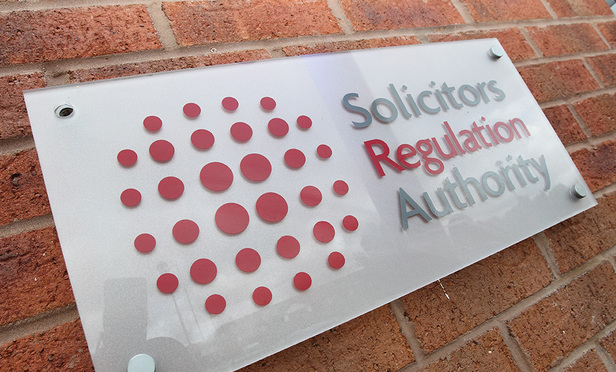UK Regulator Hits Back in Junior Lawyer Dispute Row
Some believe the dispute about the treatment of a lawyer who lost a briefcase has led to a loss of confidence in the Solicitors Regulation Authority.
May 27, 2020 at 09:25 AM
4 minute read
 Solicitors Regulation Authority
Solicitors Regulation Authority
The Solicitors Regulation Authority (SRA) has responded to criticism over its prosecution of a junior lawyer who was struck off for lying about losing a briefcase, stating that its handling was "appropriate".
In a letter to a body representing junior solicitors, Paul Philip, the chief executive of the U.K. industry regulator, rebuffed criticism of its decision to prosecute former Capsticks solicitor Claire Matthews, who also lost her license to practice law.
In the document, seen by Law.com International's Legal Week, Philip said: "I am satisfied that our handling of this case was appropriate," and later added: "neither a person's junior position, nor health, will be an answer where the person has been found guilty of culpable dishonesty."
The U.K. regulator also added that it is currently drafting new guidance which details current practice and processes where health issues are raised during proceedings.
Matthews, who had been at Capsticks for less than a month at the time of the incident, left sensitive documents relating to Capsticks' client, the SRA, in a briefcase on a train.
In what she later told the tribunal was a state of "panic", she claimed to colleagues that the briefcase was in her possession whilst attempting to locate it, and then claimed she had lost it at a later date.
According to a freedom of information request filed by Legal Week, the data loss was reported by Capsticks to the Information Commissioner's Office who decided that no further action would be taken.
In the letter, Philip said: "It is easy to lose sight of the fact that this is not about a solicitor leaving a briefcase on a train, but that the evidence of her colleagues was that she lied to them on a number of occasions about the matter."
The SRA's letter was in response to an open statement by the Junior Lawyer Division (JLD), a subset of the Law Society which represents law students and lawyers in the early stages of their career, who said there was a "loss of confidence" in the regulator.
The JLD criticised the SRA over its handling of prosecutions involving lawyers with mental health illnesses, as well as disproportionate sanctions and costs levelled against those without the means to pay it back, citing the case of Claire Matthews as well as previous cases which they argued formed a pattern.
According to documents on the case published by the Solicitors Disciplinary Tribunal, Matthews, who represented herself at the tribunal, was instructed to pay £10,000 in costs despite currently working at an NHS call centre earning £9 per hour.
Due to Capsticks being conflicted, the SRA called on Fieldfisher to handle the prosecution, with the firm charging a much higher hourly rate which was in part passed on to Matthews.
In a freedom of information response, the SRA said that it had not attempted to recover any of the additional costs from Capsticks.
Matthews has since launched an appeal against the tribunal verdict, and is being advised on a pro bono basis by Leigh Day. She has also started a crowdfunding campaign to fund legal costs which has raised over £13,000 so far.
It is not the first time the SRA's approach towards junior lawyers has attracted attention. Last summer various partners expressed shock after a former Ropes & Gray London trainee was barred from the profession after tracing a client's signature on to a client document that had been lost.
The JLD also cited the case of Sovani James, another solicitor who was struck off for backdating letters whilst at McMillan Williams and Emily Scott, a trainee at De Vita Platt who was struck off for misconduct despite claiming she was under firm instructions.
Both claimed they were working in extremely stressful and toxic working environments.
In December, a Paul Hastings London associate was rebuked by the SRA after being found guilty of driving while over the legal alcoholic limit.
Click here to read the Junior Lawyer Division's open letter to the SRA
Click here to read the SRA's response to the JLD
Read More
Lawyer Barred Over Lost Briefcase Launches High Court Appeal
UK Lawyer Loses Law License Due to Loss and Cover-Up of Sensitive SRA Documents
Is The SRA Regulating Your Private Life?
This content has been archived. It is available through our partners, LexisNexis® and Bloomberg Law.
To view this content, please continue to their sites.
Not a Lexis Subscriber?
Subscribe Now
Not a Bloomberg Law Subscriber?
Subscribe Now
NOT FOR REPRINT
© 2025 ALM Global, LLC, All Rights Reserved. Request academic re-use from www.copyright.com. All other uses, submit a request to [email protected]. For more information visit Asset & Logo Licensing.
You Might Like
View All

Jones Day, BCLP & Other Major Firms Boost European Teams with Key Partner Hires
4 minute read
$13.8 Billion Magomedov Claim Thrown Out by UK High Court
Law Firms Mentioned
Trending Stories
- 1'A Death Sentence for TikTok'?: Litigators and Experts Weigh Impact of Potential Ban on Creators and Data Privacy
- 2Bribery Case Against Former Lt. Gov. Brian Benjamin Is Dropped
- 3‘Extremely Disturbing’: AI Firms Face Class Action by ‘Taskers’ Exposed to Traumatic Content
- 4State Appeals Court Revives BraunHagey Lawsuit Alleging $4.2M Unlawful Wire to China
- 5Invoking Trump, AG Bonta Reminds Lawyers of Duties to Noncitizens in Plea Dealing
Who Got The Work
J. Brugh Lower of Gibbons has entered an appearance for industrial equipment supplier Devco Corporation in a pending trademark infringement lawsuit. The suit, accusing the defendant of selling knock-off Graco products, was filed Dec. 18 in New Jersey District Court by Rivkin Radler on behalf of Graco Inc. and Graco Minnesota. The case, assigned to U.S. District Judge Zahid N. Quraishi, is 3:24-cv-11294, Graco Inc. et al v. Devco Corporation.
Who Got The Work
Rebecca Maller-Stein and Kent A. Yalowitz of Arnold & Porter Kaye Scholer have entered their appearances for Hanaco Venture Capital and its executives, Lior Prosor and David Frankel, in a pending securities lawsuit. The action, filed on Dec. 24 in New York Southern District Court by Zell, Aron & Co. on behalf of Goldeneye Advisors, accuses the defendants of negligently and fraudulently managing the plaintiff's $1 million investment. The case, assigned to U.S. District Judge Vernon S. Broderick, is 1:24-cv-09918, Goldeneye Advisors, LLC v. Hanaco Venture Capital, Ltd. et al.
Who Got The Work
Attorneys from A&O Shearman has stepped in as defense counsel for Toronto-Dominion Bank and other defendants in a pending securities class action. The suit, filed Dec. 11 in New York Southern District Court by Bleichmar Fonti & Auld, accuses the defendants of concealing the bank's 'pervasive' deficiencies in regards to its compliance with the Bank Secrecy Act and the quality of its anti-money laundering controls. The case, assigned to U.S. District Judge Arun Subramanian, is 1:24-cv-09445, Gonzalez v. The Toronto-Dominion Bank et al.
Who Got The Work
Crown Castle International, a Pennsylvania company providing shared communications infrastructure, has turned to Luke D. Wolf of Gordon Rees Scully Mansukhani to fend off a pending breach-of-contract lawsuit. The court action, filed Nov. 25 in Michigan Eastern District Court by Hooper Hathaway PC on behalf of The Town Residences LLC, accuses Crown Castle of failing to transfer approximately $30,000 in utility payments from T-Mobile in breach of a roof-top lease and assignment agreement. The case, assigned to U.S. District Judge Susan K. Declercq, is 2:24-cv-13131, The Town Residences LLC v. T-Mobile US, Inc. et al.
Who Got The Work
Wilfred P. Coronato and Daniel M. Schwartz of McCarter & English have stepped in as defense counsel to Electrolux Home Products Inc. in a pending product liability lawsuit. The court action, filed Nov. 26 in New York Eastern District Court by Poulos Lopiccolo PC and Nagel Rice LLP on behalf of David Stern, alleges that the defendant's refrigerators’ drawers and shelving repeatedly break and fall apart within months after purchase. The case, assigned to U.S. District Judge Joan M. Azrack, is 2:24-cv-08204, Stern v. Electrolux Home Products, Inc.
Featured Firms
Law Offices of Gary Martin Hays & Associates, P.C.
(470) 294-1674
Law Offices of Mark E. Salomone
(857) 444-6468
Smith & Hassler
(713) 739-1250









